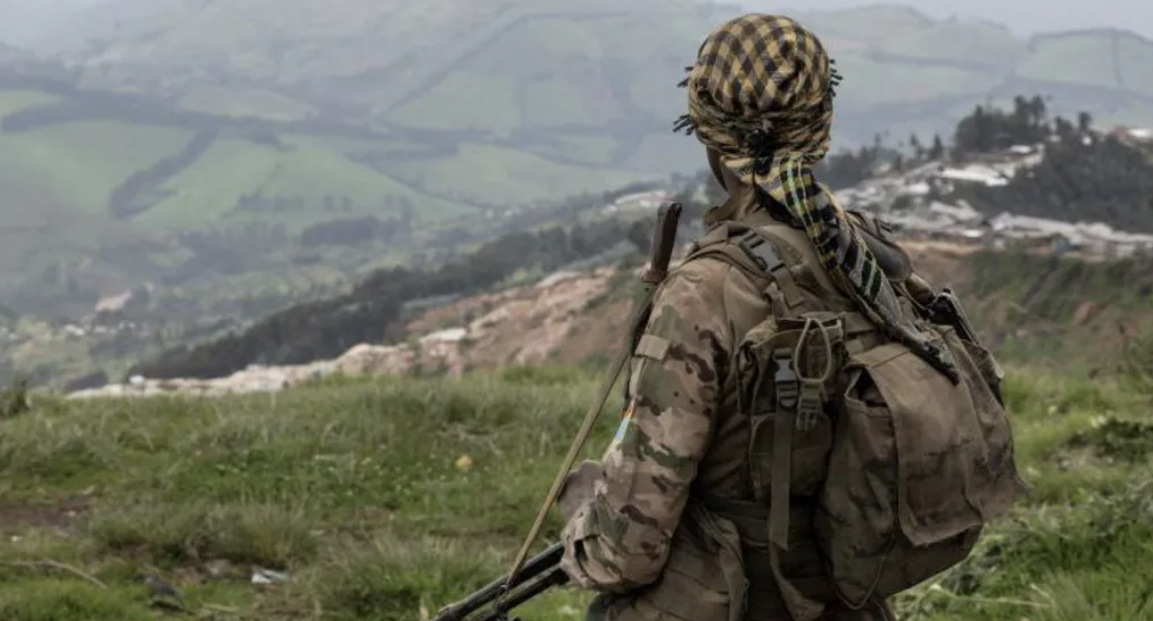

M23 rebels killed at least 140 people in eastern Democratic Republic of Congo last month in one of the worst atrocities by the armed group since its resurgence in late 2021, Human Rights Watch has said in a report.
This is despite a peace process, brokered by the US and Qatar, to end the conflict in the region.
Witnesses told the advocacy group that the Rwanda-backed rebels "summarily executed" local residents, including women and children, largely from the Hutu ethnic group in the Rutshuru area, near the Virunga National Park.
The rebels have previously strongly denied any role in these killings, calling the charges a "blatant misrepresentation of the facts".
It did not respond to a request to comment on the report, the rights group said.
The alleged massacre appears to have taken place during an M23 campaign against an armed Hutu group, the FDLR, formed by perpetrators of the 1994 genocide in neighbouring Rwanda.
HRW said the total killings in July may exceed 300, corroborating similar findings by the UN earlier this month.
Fighting between government troops and the M23 escalated in January, when the rebels captured large parts of the mineral-rich east, including the regional capital Goma.
Thousands of people have been killed and hundreds of thousands of civilians forced from their homes in the ongoing conflict, the UN says.
In the report, released on Wednesday, HRW said the M23 used machetes and gunfire to attack people in at least 14 villages and farming areas near the Virunga National Park between 10 and 30 July.
The M23 fighters surrounded and blocked off all roads into the area to prevent people from leaving, witnesses said.
"We woke up on 11 July and [the M23] were there in large numbers.… [T]hey were already on our doorstep.… [T]hey killed people with guns and machetes," a man said, adding that five members of his family were killed in Katanga area.
A woman who saw M23 fighters kill her husband with a machete on 11 July said that M23 fighters that day rounded up about 70 women and children.
"They told us to sit on the edge of the riverbank, and then they started shooting at us," the woman was quoted as saying, adding that she survived after falling into the river without being shot.
Another man said that he watched as the rebels killed his wife and four children aged nine months to 10 years from afar, according to the report.
Locals said that M23 fighters told them to immediately bury the bodies in the fields or leave them unburied, preventing families from organising funerals.
"M23 fighters also threw bodies, including of women and children, into the Rutshuru River," the report added.
Citing 25 witness accounts plus medical workers, military and UN personnel, the report said that members of the Rwanda Defence Force (RDF), were backing the M23 operation.
Earlier this month, the UN Office of the High Commissioner for Human Rights also reported that the RDF had supported the M23 killings of "at least 319 between 9 and 21 July in four villages in Rutshuru".
Kigali has not responded to the HRW claim, but it has angrily denied the UN accusations, calling them "gratuitous" and "sensational allegations", saying they risked undermining the peace process, and claiming that an armed group opposed to the M23 carried out the killings.
Rwanda denies persistent and widespread allegations that it provides military support to the M23, which is largely made up of the Tutsi ethnic group that was targeted by Hutu militias in the genocide.
But Kigali does see eastern DR Congo as a security threat, primarily because of the continued existence of the armed Hutu group, the FDLR, which fights alongside the army.
The killings occur amid stalled regional and international peace efforts to end the prolonged deadly conflict, including an agreement between Rwanda and the DR Congo government with provisions for Kinshasa to "neutralise" the FDLR.
Separately in Qatar last month, the M23 and the DR Congo government also signed a ceasefire deal, intended as a step towards a permanent peace.
But last week, as negotiations were set to resume, the M23 walked away from the peace talks. It said Kinshasa had failed to meet commitments outlined in the deal, although it has since announced it will send a "technical team" to Doha to discuss the practical arrangements for the truce.
The Congolese army has also accused the M23 of violating the ceasefire.
HRW has urged the UN Security Council, the European Union, and governments to condemn grave abuses witnessed in east DR Congo, impose further sanctions on those responsible and press for the arrest and appropriate prosecution of commanders implicated in the conflict.














